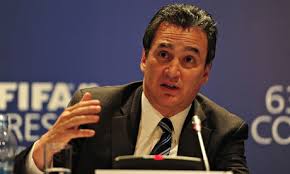By Andrew Warshaw
September 8 – The eagerly anticipated FIFA-commissioned report into possible corruption surrounding the 2018 and 2022 World Cup bid process, which took a year to compile, stretches to 350 pages and recommends sanctioning “certain individuals” .
The three-part report, finally handed over by ethics investigator Michael Garcia to ethics judge Joachim Eckart, includes testimony from more than 75 witnesses but is being kept under wraps pending any penalties against those who transgressed.
Russia and Qatar, 2018 and 2022 hosts respectively, were chosen in December 2010 by FIFA’s executive committee, many of whose most powerful figures have since either quit or been suspended amid a raft of scandals that prompted a large-scale reform programme.
FIFA did not say, in its announcement of the handover of the report, whether Garcia’s findings, drawing on 200,000 pages of evidence, has put the hosting rights of either Russia or Qatar into doubt. Qatar, in particular, has come under intense global scrutiny but has always insisted it broke no bidding rules.
The indications seem to point towards possible sanctions of individuals rather than bidding nations.
“The report sets forth detailed factual findings; reaches conclusions concerning further action with respect to certain individuals; identifies issues to be referred to other FIFA committees; and makes recommendations for future bidding processes,” FIFA said in a statement.
It is widely known that Garcia sought to interview all the FIFA executives who voted but it is unclear how many cooperated. Garcia and his investigation team say they met with officials from all nine bid candidates in a tour which started last October. He did not personally investigate Russia – where he is barred because of previous work as a US attorney – or the American 2022 bid, which lost out badly to Qatar in a final round of voting, because he is a US citizen. Separate investigations on those bids were submitted by Cornel Borbely, a Swiss lawyer who is a deputy chairman on the ethics committee.
Although there will be intense interest in the range of punishments that Eckert is expected to recommend, he cannot order a revote of either World Cup or strip either host. Only the ruling executive committee can change hosting decisions but Eckart could apply sanctions against any of those who worked for the nine bid candidates at the time or anyone who was a voting exco member at the time.
Within days of the result of joint ballot, and virtually ever since, Qatar’s landslide victory has been called into question. Partly because of FIFA’s own technical inspection team flagging up several caveats about the Gulf state, partly because of still unproven allegations of wrongdoing surrounding their bid and partly because of concerns over the fearsome desert heat which is forcing FIFA to consider switching the tournament from its traditional summer date to winter. A decision is expected next March.
Originally Garcia had set mid-July as the date for completing his report. But the deadline was pushed back as more interviews were conducted.
The full statement from the investigatory chamber of FIFA’s ethics committee reads as follows:
On Friday, September 5, 2014, Chairman Michael J. Garcia and Deputy Chairman Cornel Borbély of the Investigatory Chamber of the FIFA Ethics Committee transmitted a 350-page “Report on the Inquiry into the 2018/2022 FIFA World Cup Bidding Process” (the “Report”) to the Adjudicatory Chamber.
At the same time, Deputy Chairman Borbély delivered separate supplemental reports covering his review of activities of the United States and Russia bid teams.
Over the course of this year-long investigation, the Investigatory Chamber interviewed more than 75 witnesses and compiled a record that, in addition to audio recordings from interviews, includes more than 200,000 pages of relevant material.
The Report sets forth detailed factual findings; reaches conclusions concerning further action with respect to certain individuals; identifies issues to be referred to other FIFA committees; and makes recommendations for future bidding processes.
Pursuant to the FIFA Code of Ethics, the Adjudicatory Chamber will now make a final decision on the Report and supplemental reports, including publication.
FIFA has already changed one element of the controversial bid process. In the past the executive committee alone was charged with voting. In future the exco will recommend a shortlist for a vote by the full 209-member FIFA Congress.
Contact the writer of this story at moc.l1744753244labto1744753244ofdlr1744753244owedi1744753244sni@w1744753244ahsra1744753244w.wer1744753244dna1744753244

